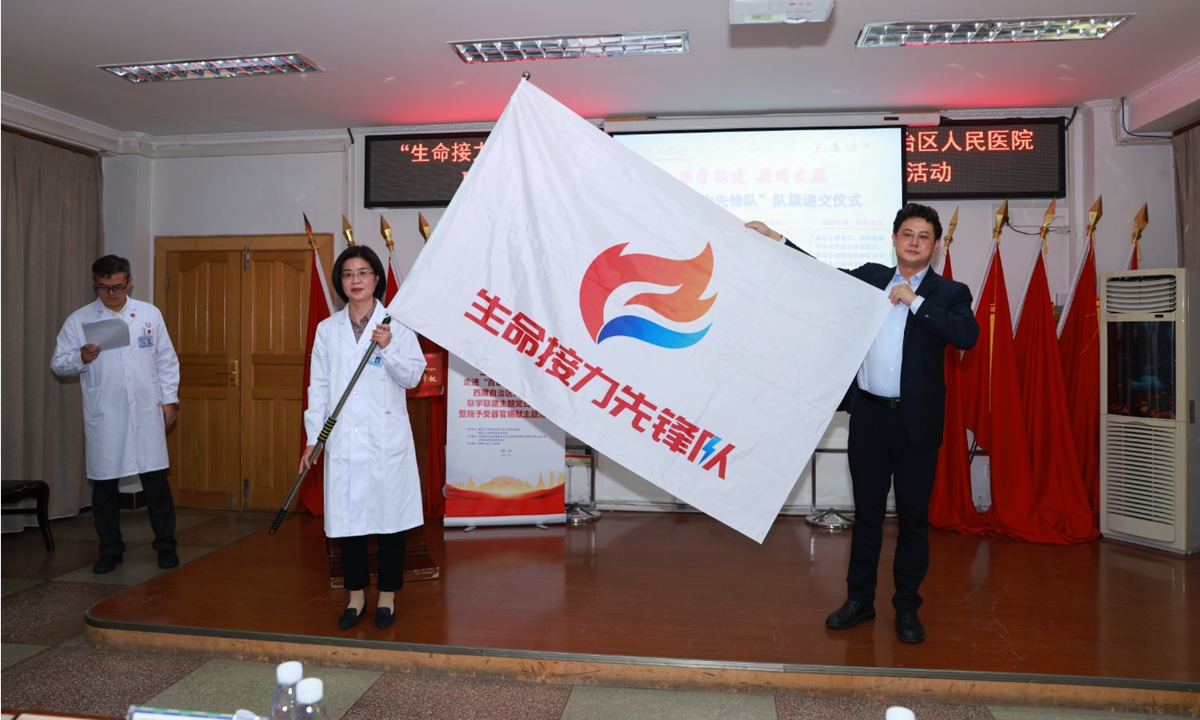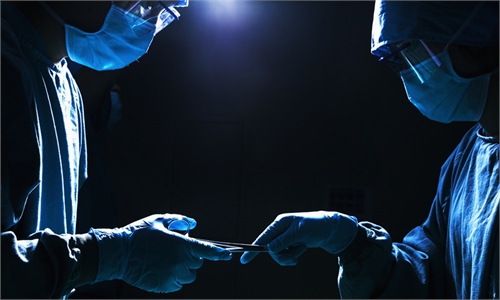
A representative from the Tibet Autonomous Region People's Hospital and Zhao Hongtao (first from right), the director of the China Organ Transportation Development Foundation (COTDF), pose for photos on Tuesday in Lhasa at the hospital to mark its participation in the campaign calling for Party members to support organ donation and transplantation. Photo: Courtesy of the COTDF
Two hospitals in Southwest China's Tibet Autonomous Region have joined the national organ donation volunteering platform, a milestone for the start of organ donations in the region.
Organ donation has been undeveloped in Tibet. When patients need organ transplants, they have to go to other parts of the country, but the need for organ transplants in Tibet is huge, experts said.
At the access ceremony themed "Life Relay Vanguard," also a Party building activity held on Tuesday, some members of the Communist Party of China from the two hospitals signed up to be organ donors.
The access of the Tibet Autonomous Region People's Hospital and the First Affiliated Hospital of Tibet University to the organ donation volunteering platform, a platform for organ donation supported by the China Organ Transportation Development Foundation, means it opens a new chapter for Tibetan people to know organ donation and help patients from Tibet in need of organ transplants to be treated locally.
"As a hospital, we have the responsibility to educate the people of Tibet about organ donation. Our access to the platform marks the first step of introducing organ donation to Tibet," Gesangluobu, a deputy head of the Tibet Autonomous Region People's Hospital, told the Global Times on Wednesday.
Next, Gesangluobu said the hospital will work on plans to promote organ donations in Tibet, first by organizing interdisciplinary medical teams to learn about organ donations and transplants within the hospital. That's especially true of urology, a department that is in urgent need of organ donations.
As the population grew and average life spans rose, the number of uremia patients and those with chronic diseases also increased. Before the introduction of organ donation, patients in the region relied on other provinces, Gesangluobu noted.
More than 3.6 million people in China have registered to be organ donors, but for a country with about 1.4 billion people, that is too low, said Zhao Hongtao, the director of the China Organ Transportation Development Foundation, an institute supported by China's National Health Commission to promote voluntary organ donations and equitable organ distributions in the country.
Zhao said "the introduction of organ donation to Tibet will enable us to explore the possibility of combining the essence of organ donation, which is to pass on love and devotion, with the essence of Buddhism, which is also to spread love."
As for the acceptance of organ donations among Tibetan people, experts and local residents told the Global Times it will take scientific research and study before making any conclusion, as the organ donation program just began.
"Buddhism has deep cultural roots among the people in Tibet. By inviting Party members to take the initiative to launch and prompt organ donations in Tibet, we hope the core socialist values of delivering love, benevolence and saving lives will be carried forward in Tibet's organ donation drive," said Huang Jiefu, head of the China National Organ Donation and Transplantation Committee.
Huang said the foundation has donated 1.5 million yuan to Tibet to propel organ donations and transplants in Tibet, hoping more experts across the country will come to the region and drive the development of organ donations and transplants.


